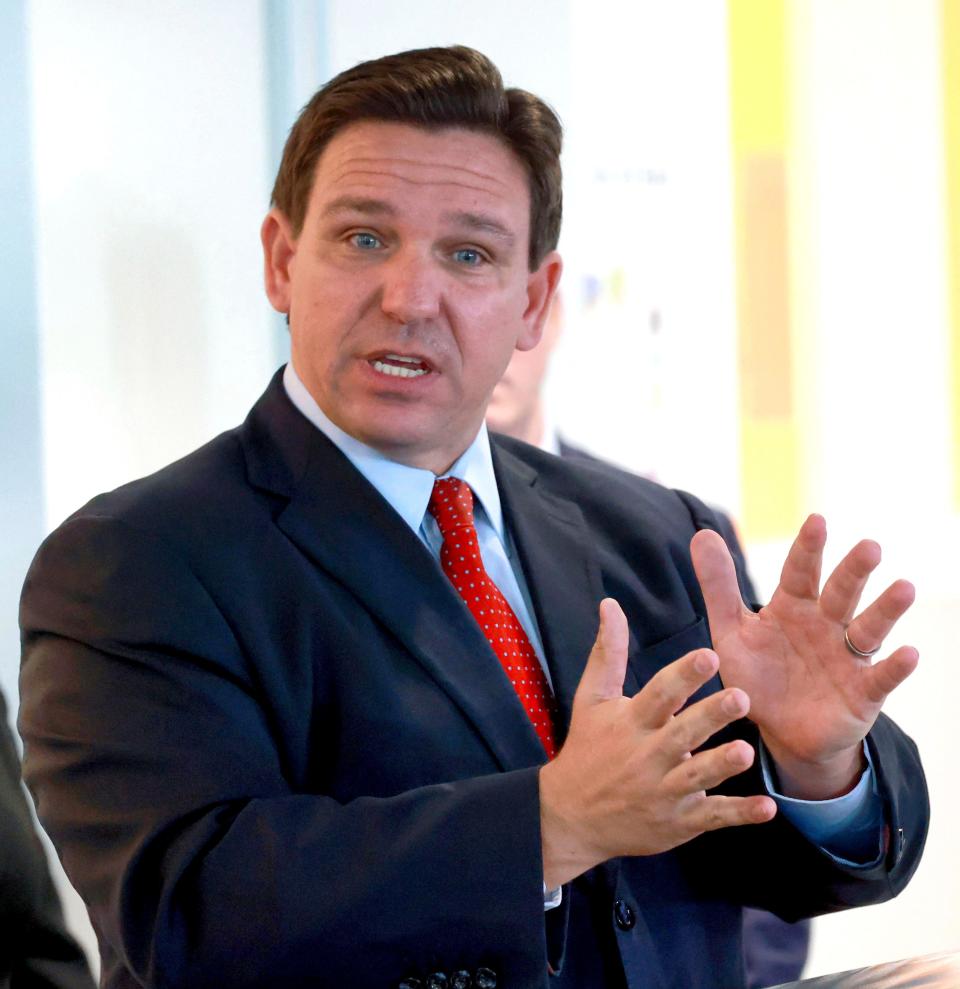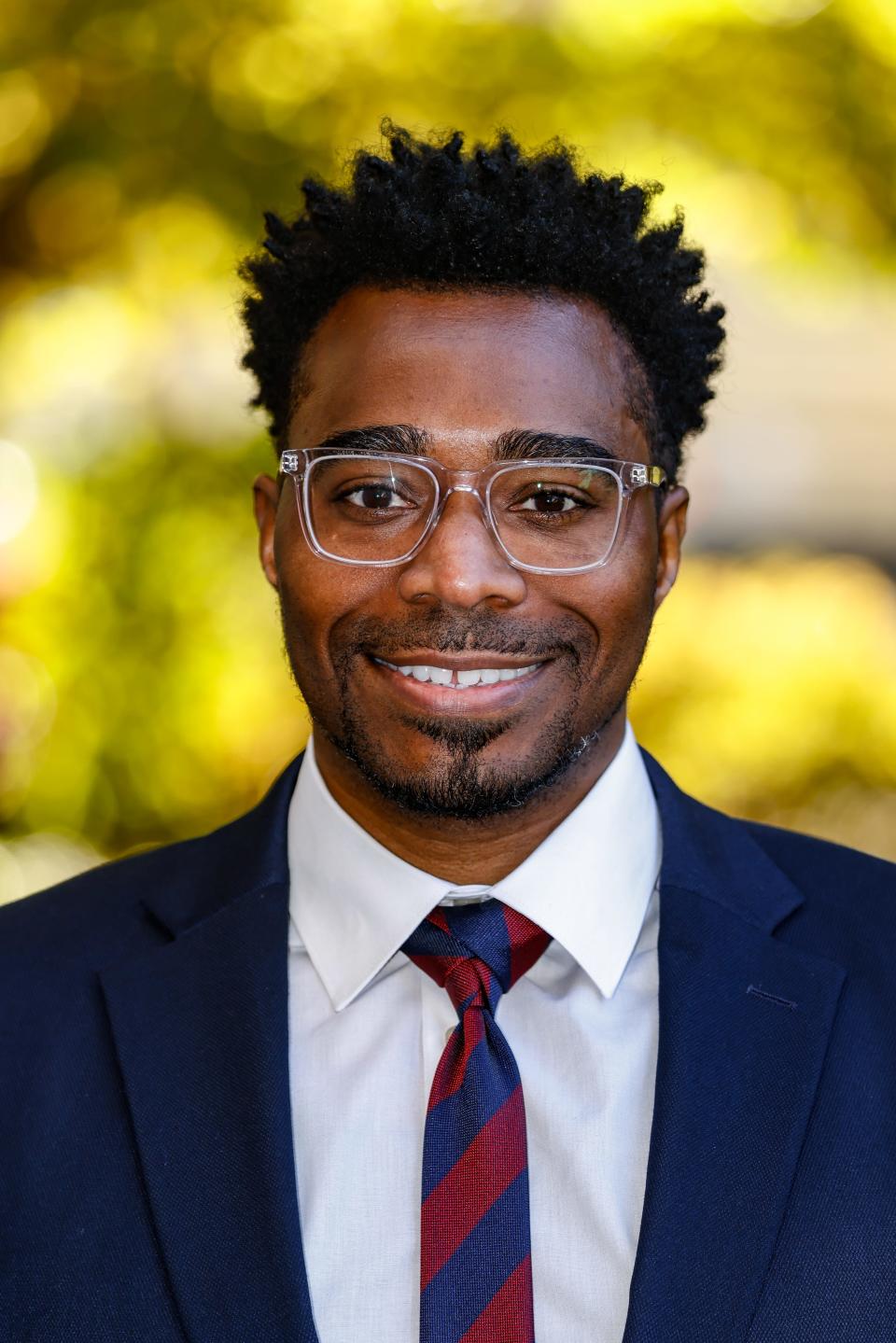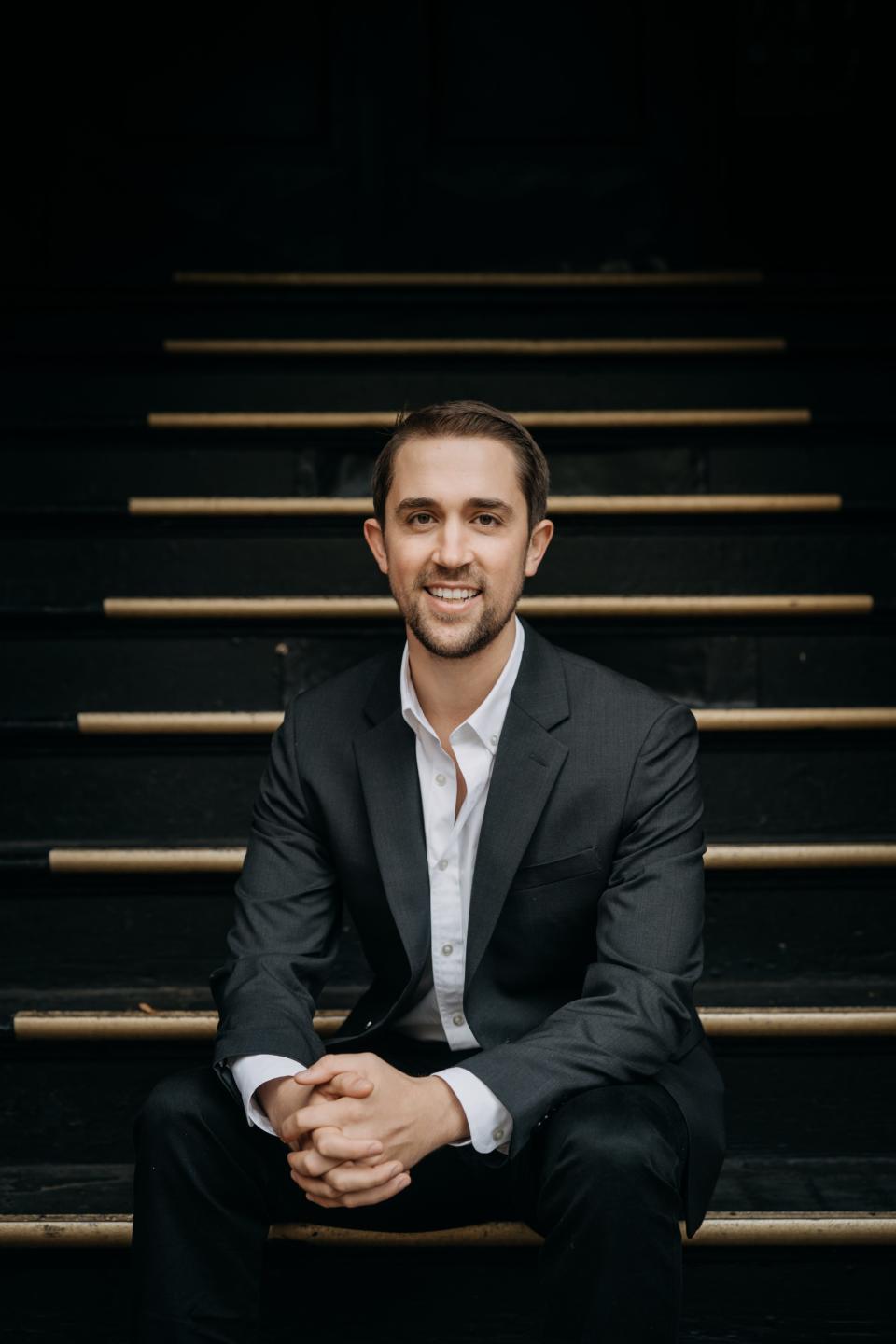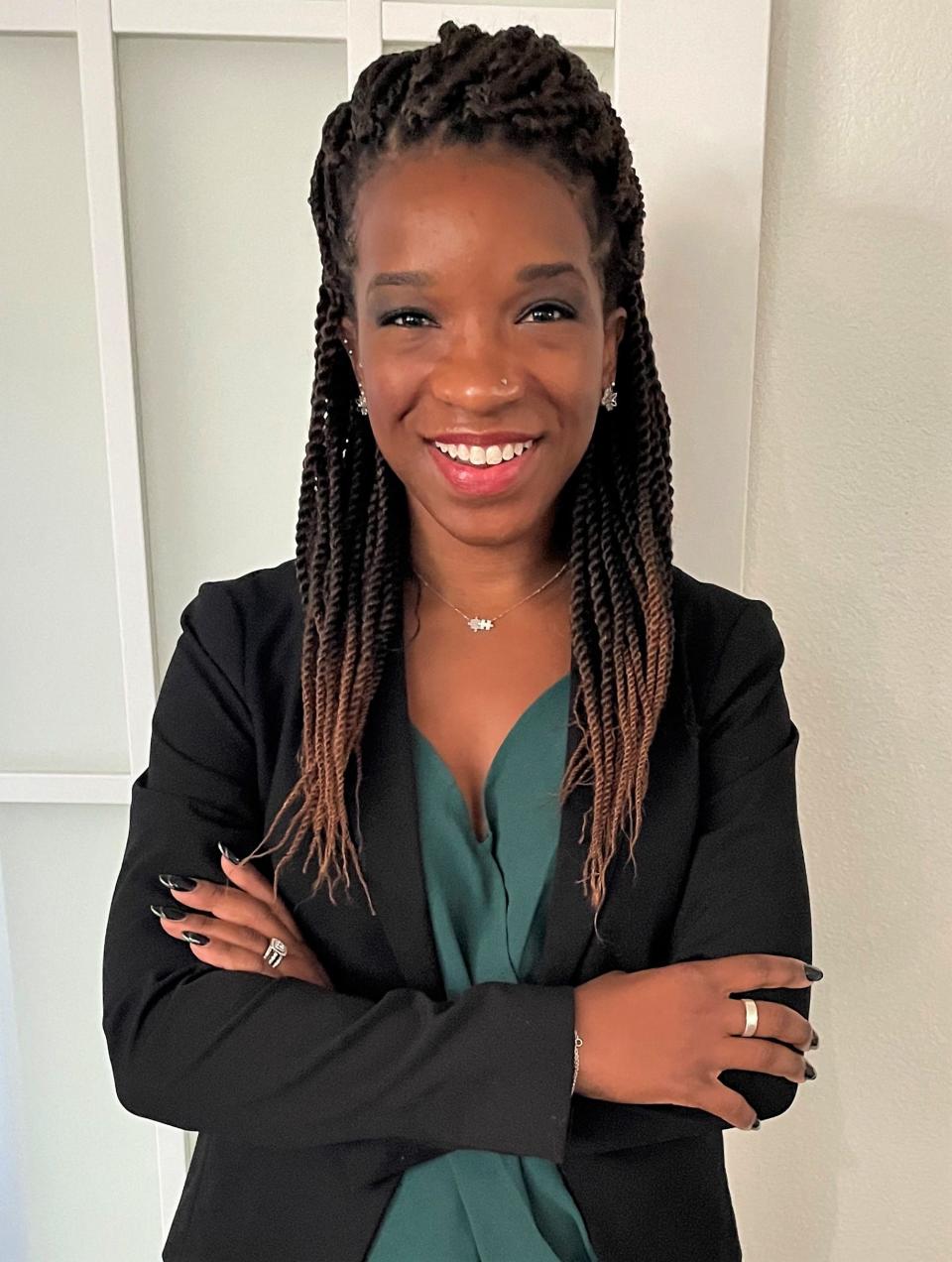'Corporate-sanctioned racism'? How war on critical race theory spread from schools to big business
- Oops!Something went wrong.Please try again later.
- Oops!Something went wrong.Please try again later.
In October, conservative activist Christopher Rufo wrote an article on the website of City Journal, a magazine of the Manhattan Institute. “Walmart vs. Whiteness” alleged that the nation’s largest employer puts on diversity workshops that denounce the United States as a “white supremacy system.”
Outraged readers fired off nearly 5,000 emails to CEO Doug McMillon in an email campaign organized by the nonprofit New Tolerance Campaign.
“This is a politically charged issue for some,” McMillon replied to one consumer, but he said he stood by the training, citing Walmart’s commitment to becoming “a more inclusive company.”
“As part of that commitment, we have had sessions for our leaders and salaried managers that encourage reflection on the history of race in the U.S. and systemic issues that Black and African American communities have faced,” McMillon said. “We have found those conversations to be constructive and thought-provoking. We don’t always agree with every comment made by every participant in a session or endorse every view on a PowerPoint slide produced by others, but the experience has been a net positive for us as we strive to create more opportunities for everyone.”
It’s not just Walmart. America's culture wars have come to cubicles and corner offices across the country.
From critical articles in right-leaning publications to legislation in statehouses, conservatives are taking aim at how racism is taught, not just in schools but in private companies. Their rallying cry: critical race theory.
What is critical race theory?
In the 1970s and 1980s, a group of legal scholars including Kimberlé Crenshaw and Derrick Bell began researching why racism against Black people and other underrepresented groups persisted despite anti-discrimination laws. They came up with an academic framework, and Crenshaw coined a term for it: critical race theory.
In short, critical race theory, or CRT, examines the role race and racism in U.S. law and institutions plays in the unequal treatment of Black people from slavery and Jim Crow to today.
Usually, it's taught in graduate courses, not in workplace diversity training. But in recent years, activists, media personalities and strategists redefined critical race theory as a conservative talking point, alleging it teaches that white people are inherently racist and turning it into a mainstream powder keg.
“Critical race theory is the idea that the United States is a fundamentally racist country and that all of our institutions including the law, culture, business, the economy are all designed to maintain white supremacy,” Rufo told the Heritage Foundation.
Leading the charge against critical race theory are conservative think tanks.
As a White House official, Russell Vought wrote a memo warning federal agencies that President Donald Trump wanted them to “cease and desist from using taxpayer dollars to fund these divisive, un-American propaganda training sessions."
Today, he runs the Center for Renewing America. He says corporations are using their human resources departments and boardrooms "to impose this radicalism in all private workplaces."

Corporations are "the main ambassadors of the state-endorsed wokeism that is ripping apart our country along racial lines," Vought said in a recent speech at Hillsdale College.
He has called on states and the federal government to strip "woke" corporations of tax breaks and other government benefits and he has worked with states on how to restrict how corporations talk to employees about racism.
Florida may allow employees to sue over critical race theory
While most legislation focuses on education, more than a handful of states including New Hampshire, Iowa and Texas have introduced or passed bills that put limits on how employees of state and local agencies or school districts and, in some cases, employees of government contractors are taught about racism.
The bills generally use language banning “divisive concepts” such as “an individual, by virtue of their race or sex, is inherently racist, sexist, or oppressive.”
Now Republicans are stepping up pressure on the private sector.
Republican Florida Gov. Ron DeSantis has made battling critical race theory one of his top legislative priorities. In December, he urged the state’s GOP-led legislature to pass legislation against it in the workplace.
Following DeSantis' lead, the Republican majority on the state Senate Education Committee this week advanced a measure that would allow workers to sue their employers if they “feel discomfort, guilt, anguish, or any other form of psychological distress on account of his or her race, color, sex, or national origin.” It does not explicitly mention critical race theory.

“How is it not a hostile work environment to be attacking people based on their race or telling them that they are privileged or that they are part of oppressive systems when all they are doing is showing up to work and trying to earn a living?” DeSantis told supporters at a campaign-style event last month at which Rufo spoke. “We believe this corporate CRT is basically corporate-sanctioned racism.”
State Senate Democrats argued the proposed legislation would lead to frivolous lawsuits and accused DeSantis, a possible 2024 presidential candidate who is up for reelection this year, of "fanning the flames of a culture war for political gain."
Rufo praised DeSantis as a trailblazer. “He's preparing a bold new agenda to fight racialist abuse,” Rufo said in an email to USA TODAY, “and, no doubt, all of the other red state governors are watching.”
Critical race theory 'bogeyman' after George Floyd murder
Rashawn Ray, a sociology professor and executive director of the Lab for Applied Social Science Research at the University of Maryland, calls the legislation "an all-out assault on companies."
“It’s straight out of Trump’s playbook when he put a halt to these types of diversity and bias trainings during his administration. Republicans at the state level are simply trying to follow that playbook and they are turning their attention to companies," Ray said. “Critical race theory is just the bogeyman here. They are attacking any sort of pursuit to do diversity, equity, or inclusion work.”
Critical race theory first became a flashpoint for conservatives in 1993 when President Bill Clinton withdrew his nomination of legal scholar Lani Guinier to lead the Justice Department’s civil rights division after conservative critics claimed she championed “a radical school of thought called ‘critical race theory.’”
Ray says the controversy resurfaced following the murder of George Floyd as companies across the country engaged in the biggest racial equity push since civil rights legislation and federal regulation first opened doors for Black workers in the 1960s and 1970s.

A USA TODAY analysis of the hiring records from 83 companies in the Standard & Poor’s 100 – a group of the nation's largest and most highly valued companies – showed that Black and Hispanic workers are underrepresented in the highest-paying and most influential positions, as well as in the ranks of professionals, such as lawyers and marketers. At the lower levels of organizations, they are concentrated – and often overrepresented – in roles such as administrative assistants, technicians and laborers.
With the nation becoming less white and more studies showing that diversity gives companies a competitive edge, corporate America says it has prioritized hiring and promoting more workers from underrepresented backgrounds and begun holding antiracism training.
Some employees reject 'racialized' training
Companies say that training is vital to building inclusive work cultures that are welcoming of people of all races and backgrounds. But it doesn't sit well with everyone.
In October, a former employee of American Express filed a discrimination complaint with the Equal Employment Opportunity Commission. Brian Netzel, who was a client manager in Phoenix, said he was told he was being fired for posting memes on his Facebook page. The truth, he alleged, is that he was fired, in part, for voicing objections to "racialized" workplace training.
“The tone and tenor of the trainings and the policies instituted by AmEx established a clear narrative: That America was, and remains today, systemically racist; that employees have to view each others’ race, first and foremost, when interacting with each other – the reason being that white employees all harbor some form of bigotry, regardless of whether they agree with this or not; and that any dissent from this established narrative would not be tolerated,” Netzel said in his complaint against American Express.
American Express said the complaint has no merit.
"We have a longstanding commitment to living our company values, which include fostering a diverse and inclusive culture where all colleagues feel welcome and heard and have equal opportunities to thrive," American Express said in a statement to USA TODAY. "Our diversity, equity, and inclusion programs are singularly about upholding this commitment."
The National Center for Public Policy Research's Free Enterprise Project, a conservative shareholder activist organization, is pushing a shareholder resolution that would require American Express to turn over employee training materials or submit to a "workplace nondiscrimination audit." American Express rejected the proposal. The Free Enterprise Project is appealing to the Securities and Exchange Commission.
University of Maryland’s Ray says Republicans hold only so much sway over the private sector.
“Companies have the autonomy to do what they see fit,” he said. “It will be up to corporations to stand their ground. It will be interesting to see the ones who do and the ones who don’t.”
Trump fired first salvo on critical race theory
Rufo is widely credited with turning critical race theory into a catchall phrase for terms such as white privilege and systemic racism. He says he began using it as shorthand because “political correctness” was too dated, “cancel culture” too vacuous and “woke” too broad.
“‘Critical race theory,’” he told the New Yorker magazine, “is the perfect villain.”
“Strung together, the phrase ‘critical race theory’ connotes hostile, academic, divisive, race-obsessed, poisonous, elitist, anti-American,” he said.
In the summer of 2020, an employee of the city of Seattle tipped Rufo to an anti-bias training session that divided employees up by race.
“Under the banner of ‘antiracism,’ Seattle’s Office of Civil Rights is now explicitly endorsing principles of segregationism, group-based guilt, and race essentialism – ugly concepts that should have been left behind a century ago,” he wrote.
Soon more reader tips flowed into his inbox. That September, Rufo called on Trump to ban critical race theory during an appearance on Fox News' “Tucker Carlson Tonight.”
“What I’ve discovered is that critical race theory has become, in essence, the default ideology of the federal bureaucracy and is now being weaponized against the American people,” Rufo told Carlson.
Rufo got Trump’s attention. Two days later, the White House Office of Management and Budget under Vought issued a memo instructing federal agencies to identify all contracts or other spending on critical race training or training that suggests that “any race or ethnicity is inherently racist or evil.”
A Trump executive order soon followed, banning federal agencies and government contractors from spreading “divisive, anti-American propaganda” that the U.S. is “inherently racist, sexist, or oppressive, whether consciously or unconsciously.”
The executive order sent chills through the private sector. Corporations with government contracts worried that the diversity training they offer employees might run afoul of the new rules.
Asked about his executive order during the first debate of the presidential election, Trump said: "They were teaching people that our country is a horrible place, it’s a racist place. And they were teaching people to hate our country. And I’m not gonna allow that to happen."
Then-Democratic-nominee Joe Biden responded: “Nobody’s doing that.”
Ultimately, a California federal court blocked Trump's executive order and Biden overturned it shortly after taking office.
CVS Health, Verizon criticized for 'woke' training
Rufo was undaunted. For months, he’s been publishing a popular series on “woke capital” at the Manhattan Institute's City Journal, where he is a contributing editor.
In September, for example, Rufo reported that CVS Health forced employees to deconstruct their racial and sexual identities then rank themselves according to their privilege. New Tolerance Campaign urged consumers to sound off to CEO Karen Lynch. The campaign generated more than 1,000 messages. CVS Health declined to comment.

Other Rufo reports include:
Defense contractor Lockheed Martin sent executives to a retreat to deconstruct their “white male privilege.”
Walt Disney recommended that employees “participate in reparations” and “decolonize” their bookshelves.
Verizon advocated for defunding the police.
Google taught employees that all Americans are “raised to be racist.”
American Express believes that capitalism is racist.
While some companies declined to comment on his reports, others took sharp exception.
Walt Disney accused Rufo of distorting documents to make them appear as if they reflected company policy “when in fact their purpose was to allow diversity of thought and discussion on the incredibly complex and challenging issues of race and discrimination that we as a society and companies nationwide are facing.”
Verizon said Rufo quoted from panel discussions Verizon hosted about the social unrest following Floyd’s killing. In one session, a guest speaker called for more police resources to be diverted to community groups. The opinions of guest speakers do not reflect the opinions of Verizon, the company said.
“The article alleged that Verizon supports ‘defunding the police,’” Verizon said. “This is completely false and absolutely absurd.”
Rufo told USA TODAY that he stands by his reporting.
Will businesses halt antiracism training?
With GOP critical race theory measures hijacking the national conversation about racial inequality, will the pressure campaign put a stop to antiracism training in the workplace? Evelyn Carter, president of diversity firm Paradigm, doesn't think so.
Paradigm fielded a handful of inquiries when the Trump administration issued its executive order in 2020 and a couple more last year when the national conversation about critical race theory heated up.
“They listened to our answers, and it did not deter them from working with us,” Carter said.

She says Republicans are ginning up unfounded fears by deliberately misrepresenting the intent and content of diversity, equity and inclusion training to stop people from having these conversations in the workplace “because they are scary, because they are threatening and because they cast a light on some of the darkest parts of American and global history.”
But the strategy isn't working, Carter said. Corporations are committed to this work. And if they aren't, she said, they should be.
“In 2020, when many organizations made the public statements they want to be antiracist organizations, they made a commitment to the public and they made a commitment to their employees – particularly their Black employees and their employees of color – to do better,” Carter said. “So when there is a conversation about: Should we be doing these kinds of trainings or should we be having conversations, your employees of color are watching for how you navigate it.
“Because this work is going to be challenging. And, if all it takes is for someone to tell you that you shouldn’t be doing it because it’s hard, you are doing a disservice to the people who put their trust in you to do better by them. I really want to encourage organizations and leaders to stick with it.”
Have you attended critical race training at work?
Have you attended antiracism or racial sensitivity training at work? USA TODAY is working on stories about workplace diversity training. Share your thoughts on the form below. If you don't see a form, click here.
This article originally appeared on USA TODAY: Critical race theory: GOP targets Google, Walmart and Disney training

